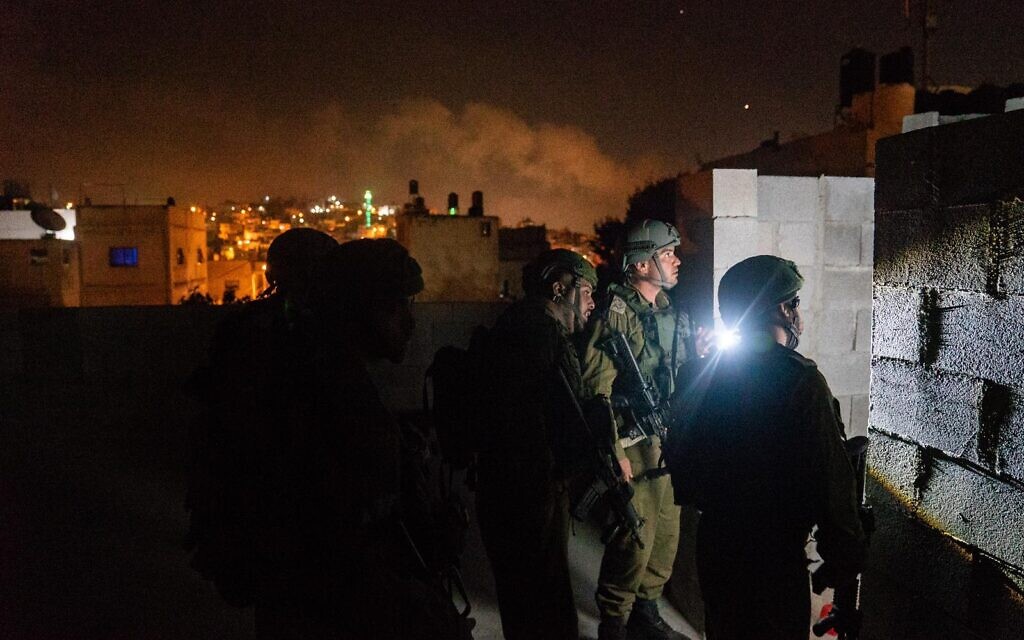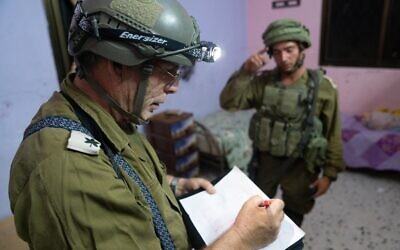The Israel Defense Forces soldiers raided the West Bank home of a Palestinian suspected of stabbing an Israeli man to death and began planning to demolish the structure, the military said Thursday.
In a predawn operation, Israeli troops measured the home of Khalil Abd al-Khaliq Dweikat, 46, in the northern West Bank village of Rujeeb outside Nablus in order to begin drawing up demolition plans for the structure.
Earlier in the night, soldiers from the Kfir Infantry Brigade also raided the home, confiscating documents and questioning the suspect’s family members with the help of the Shin Bet security service.
On Wednesday, Dweikat stabbed to death 39-year-old Rabbi Shai Ohayon near the Segula Junction in the Tel Aviv suburb of Petah Tikva, according to police, who said the assault appeared to be a terror attack.

Rabbi Shai Ohayon, who was stabbed to death in an apparent terror attack at Segula Junction on August 26, 2020. (Courtesy)
Ohayon, a father of four, was a member of Petah Tikva’s ultra-Orthodox community and studied full time at a religious institution known as a kollel in the nearby town of Kfar Saba, according to Haredi news outlets.
“Overnight, IDF soldiers operated in the village of Rujeeb… to map out the home of the terrorist suspected of carrying out the stabbing attack yesterday in Petah Tikva in which Rabbi Shai Ohayon — may his memory be blessed — was murdered,” the IDF said.
“The mapping out was conducted in order to examine the possibility of demolishing the home,” the military said.

Israeli troops in the northern West Bank village of Rujeeb measure the home of a suspected Palestinian terrorist who allegedly stabbed to death an Israeli man the day before, on August 27, 2020. (Israel Defense Forces)
Shortly after the stabbing attack on Wednesday, Prime Minister Benjamin Netanyahu said the military would work quickly to demolish Dweikat’s home.
“My wife Sara and I embrace the family, the wife and four children who were left today without a father. We will work to demolish the home of the terrorist and seek the most severe punishment,” Netanyahu tweeted.
Mapping of homes for razing is typically carried out by the army within days of a suspect being arrested, though the actual demolition must usually wait several weeks or months until a final okay is given and an appeals process exhausted before moving ahead.
The practice of razing the family homes of terrorists is a contentious one in Israel, one that has fallen in and out of favor in the military over the decades. It is regularly criticized by human rights groups, but defense officials and politicians have defended its use as an effective, necessary deterrent against terrorism.

Israeli troops in the northern West Bank village of Rujeeb measure the home of a suspected Palestinian terrorist who allegedly stabbed to death an Israeli man the day before, on August 27, 2020. (Israel Defense Forces)
Critics claim that, in addition to being a form of collective punishment, house demolitions could be counterproductive, motivating family members and friends of terrorists to launch attacks themselves.
The issue has returned to the public eye in recent weeks after the High Court of Justice rejected a request by the government to demolish the entire three-story building in which a Palestinian assailant suspected of killing Israeli soldier Amit Ben-Ygal lived, saying the military could only destroy the attacker’s rooms. This prompted an outcry against the court decision by Ben-Ygal’s family, as well as Netanyahu and Defense Minister Benny Gantz.
Right-wing politicians have also called for demolitions to take place immediately, claiming that waiting erodes any deterrent benefits. Suspects do not necessarily need to be convicted before demolitions take place.

Khalil Abd al-Khaliq Dweikat who is suspected of carrying out a deadly stabbing attack in Petah Tikva, in an undated photograph. (Facebook)
Dweikat was in Israel with a legal work permit, according to the Shin Bet security service. He was arrested near the scene shortly after the attack at Petah Tikva’s Segula Junction, police said.
Dweikat, a father of six from the Nablus area, had no history of terrorist activities, the Shin Bet said.
Upon his arrest, officers searched the suspect and found a bloodstained knife that was apparently used in the attack, police said.
The police handed over Dweikat to the Shin Bet for interrogation. The security service said it was looking into the possibility that he had a history of mental illness, but that it was “too soon to tell” if that could explain the attack.
It is highly unusual for Palestinians with legal work permits to carry out attacks in Israel, having undergone significant background checks and regular screenings by Israeli security services. It is similarly uncommon for these kinds of attacks to be carried out by middle-aged men; typically assailants are in their teens or twenties.

Family and friends attend the funeral of stabbing victim Rabbi Shai Ohayon at the Segula cemetery in Petah Tikva, August 27, 2020. (Noam Revkin Fenton/Flash90)
Ohayon’s funeral was held in Petah Tikva’s Segula Cemetery in the early hours of Thursday morning, with 40 people in attendance and over 150 more outside the burial ground due to coronavirus restrictions. He is survived by his wife Sivan and their four children: Tohar, 13, Hillel, 11, Shiloh, 9, and Malachi, 4.
Evyatar Cohen, Ohayon’s former neighbor, said at the funeral, “He was a humble man, kind and quiet. It turns out there was a genius among us and we didn’t know it.”
Times of Israel staff contributed to this report.
 RSS Feed
RSS Feed















 August 27th, 2020
August 27th, 2020  Awake Goy
Awake Goy  Posted in
Posted in  Tags:
Tags: 













